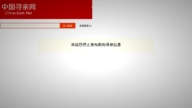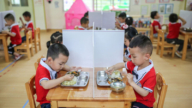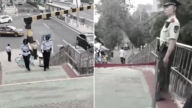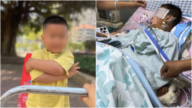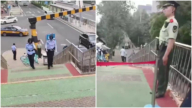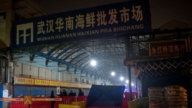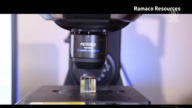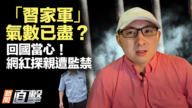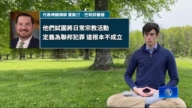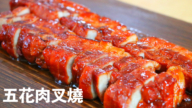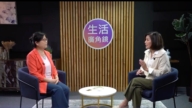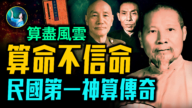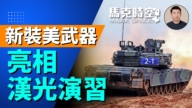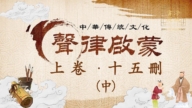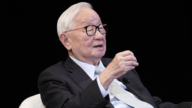【新唐人2012年6月1日讯】日前《环球时报》因刊发社论鼓吹“适度腐败论”遭网民围攻,报社主编胡锡进指责《腾迅》网擅自更改标题,误导读者,但被网民踢爆《腾迅》只是借用了原社论的标题。中共团报《中国青年报》、《新华网》31号也加入挞伐的行列,批驳《环球》的论调是“祸国之论”。
31号《中国青年报》刊发题为“舍制度和民主之外,反腐无解”的评论文章,文章指出,《环球时报》近日刊发“反腐败是中国社会发展的攻坚战”社论,看题目,本以为是批评腐败、倡导反腐,可剥去粉饰观点的文字游戏,究其实质,却是让人目瞪口呆的“宽容腐败”谬论。
文章摘录《环球时报》29号社论中的相关内容,如:“腐败在任何国家都无法根治,关键要控制到民众允许的程度… ”还有,“民间也要在大道理上理解中国无法在现阶段彻底压制腐败的现实性和客观性… ”再有,“中国显然处于腐败的高发期,彻底根治腐败的条件目前不具备”等。
“权利运动”组织发起人之一的胡军指出,中共本身就是“黑帮体制”,如果不腐败就进不了中共这个圈子。
胡军:“你不黑,你不干这个事你就不是个官,你想当官你必须要(腐败),这是共产党考核它干部的标准,独裁暴政极权就是这样的,最后腐败相互残杀到最后自灭,它就是走一个自灭的过程。”
大陆维权律师唐荆陵表示,《环球时报》作为中共喉舌讲出这种话,无非是想让民众能在心理上接受中共官员的腐败问题。
唐荆陵: “它现在不单单是承认它腐败是广泛存在,而且认为它们这体制是非腐败不可啦,它这个话实际上表明了它们面临的这么一个困境。但是它指望民众能接受它这种腐败,我看是自取其辱了,所以现在很多网民要《环球时报》出来道歉。”
“中国天网人权事务中心”发言人蒲飞指出,目前腐败问题如此猖獗的情况下,《环球时报》这篇社论为腐败提供理论支撑和借口,挑战了人们容忍的底线。
蒲飞:“因为毕竟容忍腐败这是挑战了全人类的基本共识和道德底线的,确实挑战了体制内这么多年反腐败的宣传,那么即然你要容忍腐败,你还要中纪委干什么用?这篇社论它确实超出了言论自由的范围,我们希望《环球时报》至少要做一个书面解释,说出这个东西它到底要讲什么?”
这篇社论发表后,曾被大陆众多媒体和论坛以“环球时报:要允许中国适度腐败,民众应理解”为标题广泛转载,并遭网民围攻唾骂。面对汹涌的谩骂声,30号《环球时报》在官方微博上提出:其他网站修改标题转载的做法“误导读者阅读”。同时报社主编胡锡进也在新浪微博上留言说:“腾讯网是改《环球时报》标题的始作俑者”。
当天傍晚《腾讯网》公开向《环球时报》道歉,但被网民揭爆,原来《环球时报》和《人民网》最初都使用过这个标题,《腾讯》只是原封不动的借用而已。网民还将原标题的截图发在网上。
网民斥责《环球时报》和胡锡进无耻,面对公众唾骂,诬陷《腾讯网》替《环球》背黑锅。
蒲飞:“当然(环球)会找一个替罪羊,但是我认为《环球时报》现在主要问题不是找替罪羊的问题,而是应该自己检讨一下的问题。”
胡军指出,《环球时报》就是中共在海内为混淆视听,为中共作欺骗宣传的发声筒。像这种拿中共秘密资金为中共站台的华文媒体在国际上大量存在。
采访编辑/李韵 后制/君卓
“Modest Corruption” Editorial Criticized By CCP
The Global Times’ “modest corruption” editorial
was criticized onrushing by Chinese netizens.
Chief editor Hu Xijin blamed News.qq.com of unauthorized
changes to the editorial’s title, misleading readers.
Yet netizens revealed that News.qq.com
just used the editorial’s original title.
On May 31, the, Chinese Communist Party’ (CCP) media
China Youth Daily and Xinhua criticized Global Times.
Both major media refuted
the editorial as jeopardizing to the country.
On May 31, China Youth Daily published “No change on the
system and the democracy, anti-corruption has no way out.”
The article criticized Global Times’ recent editorial, titled
‘Anti-Corruption, Uphill Battle of China’ Social Development’.
From the title, the editorial was supposed to be
a criticism of corruption and promotion of anti-corruption.
However, with some words removed, its essence is simply
fallacy that condones corruption, says the critique.
China Youth Daily’s review article excerpted some parts
of the Global Times’ editorial.
“No corruption can be eradicated in a country, the key is
to control corruption to the extent allowable by the public.”
“Society should understand the major principle of reality
objectively. Present China cannot suppress corruption.”
“China clearly has high corruption, conditions are not yet
in place to thoroughly eradicate corruption."
Hu Jun, co-initiator of Human Rights Campaign in China,
comments that the CCP has a “mafia system” itself.
The CCP’s circle does not embrace anyone
who is incorruptible, Hu remarks.
Hu Jun: “If you are clean and reject the corruption,
you cannot be a CCP official.
If you want to become an official, you have to be corruptible.
That’s the CCP criterion to assess its cadres’ performance.
The totalitarian regime just goes through a self-destruction
process: corruption – the internal slaughter – final demise.”
China’s human rights lawyer Tang Jingling says the editorial
tried to convince the public to accept officials’ corruption.
Tang Jingling: “It not simply admits corruption prevalence,
it also claims its establishment has to be corruptible.
The remarks actually show a plight
that the regime faces at the moment.
But it just discredits itself by calling for the public
to accept its corruption, I think.
So a slew of netizens are demanding the Global Times
to publicly apologize."
Pu Fei, spokesman for China 6.4 Tianwang Human Rights
Information Center, comments on the Global Times’ article.
In light of existing rampant corruption, the editorial provides
theoretical support and excuse for corruption’s existence.
This is challenging the base line of the public’s tolerance
for corruption, Pu remarks.
Pu Fei: “Condoning corruption is challenging
human beings’ basic perception of the moral’s base line.
The editorial challenges the anti-corruption propaganda too,
which the regime has trumpeted all these years.
Now that you intend to tolerate corruption, is there a need
for Central Commission for Discipline Inspection to exist?
This editorial has really gone beyond
the limit of freedom of speech.
Here we would like the Global Times to provide
a written explanation of, what was that it wanted to say?"
China’s media and internet forums have spread the editorial,
“Global Times: Modest Corruption Should be Allowed and Be Understood By the Public.”
The editorial provoked netizens’ onrushing condemnation.
On May 30, Global Times said in its Weibo, websites
had changed the editorial’s title, “misleading readers.”
Global Times’ chief editor Hu Xijin posted on Sina Weibo,
“News.qq.com is at fault for changing the editorial’s title.”
That evening, News.qq.com made a public apology
to the Global Times.
Unexpectedly, netizens exposed that the changed title was
originally used by the Global Times and by People.com.cn.
News.qq.com just borrowed it intact from them.
Netizens also uploaded online a screenshot
of the Global Times’ editorial with its original title.
Netizens denounced the Global Times
and Hu Xijin as shameless.
Facing public’s accusations, the two made News.qq.com
the Global Times’ scapegoat, said netizens.
Pu Fei: “(Global Times) would surely find a scapegoat.
The key question for Global Times now should be
not who to blame, but how to apologize to the public."
Hu Jun points out that Global Times is CCP’s mouthpiece,
which purpose is to mislead the public in China and abroad.
Such Chinese-language media under the auspices of CCP
have abounded the international arena, Hu Jun says.



